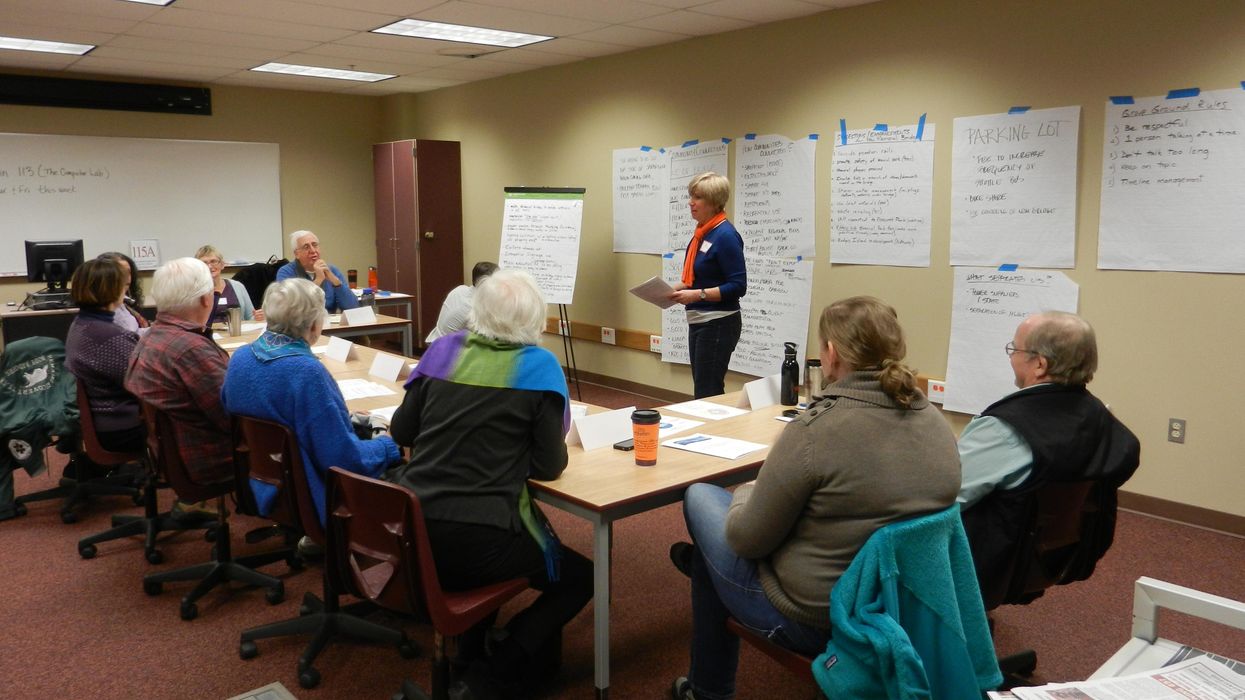Picture this: You're at a public meeting. Members of the public share concerns at the microphone, with a timer buzzing if they talk too long. The council sits quietly and does not respond to the public's comments, and then proceeds with the agenda once the public comment period is over. Something about the process just feels wrong, but you can't deviate from the rules of the meeting. Or can you? Some communities across the country are changing the law to allow for more participatory public meetings. And you can too.
The shift from in-person to online meetings during the pandemic is an example of how we actually can change the way we hold public meetings. Some communities are even electing to keep online components intact after the pandemic ends in order to allow for easier participation. As we think about changing public meetings, this seems like the moment to take stock of how we structure our meetings in general. Is the way that we have historically held public meetings the best way? Are we truly engaging the public? Perhaps some of us feel compelled to update antiquated meeting structures with more contemporary ways to engage, ways that are more participatory and less dry than the standard Robert's Rules style of meeting. However, in an era of volatile public meetings, deviating from the norm in any way can feel frightening. And where would you even start?
Communities across the United States are starting to experiment with more modern styles of public meetings that are participatory and collaborative. For instance, the city of Austin, Texas, has an entire Public Participation wing of its government. In Chicago and Boston, cities have experimented with the public's participation in deciding budget priorities. In 2017, Portsmouth, N.H., voted to change its city council rules to allow more public dialogue in public meetings.
Portsmouth historically used a traditional city meeting format of Robert's Rules of Order and public comment. But then the city voted to change its meetings to include community dialogue sessions that replaced public comment. The rationale for changing the meeting structure was to promote more engagement between the council and the public. Former City Councilor Chris Dwyer commented that the former meeting structure was "not a thoughtful way to solve problems or build relationships'' and often just attracted the "usual suspects" rather than a diverse cross-section of the community.
In Portsmouth's community dialogue sessions, the nine city councilors break into small groups with constituents and lightly facilitate a conversation where community members can bring up any topics on their mind. The city's switch to dialogue was certainly helped by the fact that Portsmouth has a culture of using dialogue in public decision-making due to an organization led by Jim Noucas called Portsmouth Listens.
Portsmouth Listens has facilitated community dialogues for decades, providing people in the community a chance to have a say in community decisions. Each election year they host a dialogue series called "candidates conversations." During a local election, the public can attend candidates' conversations to help inform their vote. Rather than the candidates for public office talking at the crowd, they are asked to engage in dialogue with local people, listening to the public's priorities and responding to their questions. As an example of what public dialogue can achieve, Portsmouth Listens has used dialogue over the years to inform where to build its public schools, how to address gaps in public transportation and how to ensure affordable housing in an increasingly pricey local real estate market.
The Portsmouth City Council's recent shift from public comment to public dialogue has not been without its complications. Although the city's intent was to move to public dialogue in every city council meeting, this idea was met with some fear from the community that eliminating public comment was taking away their right to speak. So the city compromised with alternating monthly meetings – one with the traditional meeting structure, the next with public dialogue.
City Councilor John Tabor realized that cities should "custom fit" engagement processes to particular goals rather than using only one approach to engaging the public, drawing upon dialogue, surveys or other methods as needed. In an era where many communities are distrusting or dissatisfied with their local government, flipping the script on how we engage the public may be the answer.



















Trump & Hegseth gave Mark Kelly a huge 2028 gift